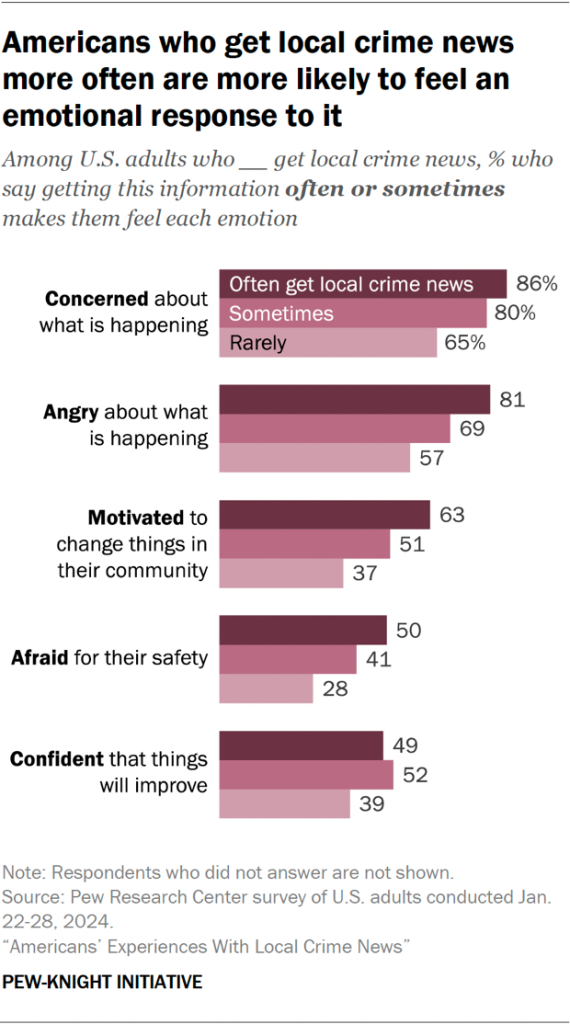To better understand the ways that Americans respond to local crime news, we asked how often respondents feel certain emotions after seeing or hearing this type of news.
- Americans who get news about crime in their community are most likely to say this coverage at least sometimes makes them feel concerned (79%) or angry (71%) about what is happening. Around three-in-ten Americans (29%) say they often feel concerned when getting this type of news.
- People are less likely to say they at least sometimes feel motivated to change things in their community (52%), confident that things will improve (48%) or afraid for their safety (41%) after getting news about crime in their local area. This includes no more than about 10% who say they often feel each of these reactions to news about crime in their community.
About one-in-five U.S. adults (19%) say they never feel afraid for their safety when receiving local crime news – with this response more likely among men (24%) than women (14%). Indeed, women are more likely than men to say they experience most of these feelings in response to crime news, with the exception of feeling confident that things will improve.

Americans who often get local crime news are more likely than those who get it less often to at least sometimes experience most of these feelings in response to crime news.
These frequent crime news consumers are not only most likely to experience concern, anger and fear, but also are far more inclined to say they often or sometimes feel motivated to change things in their community than those who rarely or never consume crime news (63% vs. 37%).
Which Americans are more likely to feel afraid after seeing crime news?
Americans who often get news about local crime are more likely than others to report feeling afraid for their safety after seeing or hearing crime news. Other groups that are particularly inclined to experience fear include:
- Nearly half of U.S. women (49%) report that they often or sometimes feel afraid in response to news about crime in their area, while about a third of men (34%) say the same.
- Half of Americans who have lower incomes say this, compared with 38% of middle-income adults and a third of higher-income adults.
- Americans who live in urban areas (50%) are more likely than those who live in suburban (40%) or rural (35%) areas to say crime news at least sometimes makes them feel afraid for their safety.
- Racial and ethnic minority groups are more likely than White Americans to feel afraid. While 35% of White Americans report at least sometimes feeling afraid for their safety after getting crime news, at least half of Asian (61%), Hispanic (51%) and Black (50%) Americans say the same.
Americans’ responses to hearing news about local crime
This survey explored four specific ways in which Americans may have acted upon hearing about crime in their community, apart from their emotional responses. These actions include whether they have spoken with friends and family, posted on social media, expressed concerns to local officials, or spoken to a journalist.
Overall, Americans are far more likely to have spoken with friends, family or neighbors about crime in their local community than to have taken any of the other actions. About three-quarters of Americans (73%) say they have spoken with other people about crime in their community. Friends, family and neighbors are also a key source for people to get news about local crime.
Around one-in-five Americans say they have posted or shared about crime online (21%) or expressed concerns to local officials or to the police (19%). And only 5% say they have contacted or spoken to a journalist about crime in their local community.
Overall, those who get local crime news more often are more likely to act upon this news. For instance, 81% of U.S. adults who often get crime news say they have spoken with family, friends or neighbors about local crime, compared with 57% of those who rarely or never get this news. This group is also more likely to have posted about local crime online and to have expressed concerns about it to local officials.
Responses to local crime news by age and income
Younger Americans are more likely than older adults to have posted on social media or somewhere else online about crime in their local community. Nearly three-in-ten Americans ages 18 to 29 (28%) say they have done this, compared with 10% of Americans ages 65 and older.
On the other hand, older Americans are more likely to have spoken to local officials to express their concerns about crime. About a quarter of adults ages 50 and older (23%) say they have expressed concerns about crime to local officials, while 14% of those ages 18 to 29 say the same.
Americans with lower incomes are more likely than those with middle and higher incomes to have posted or shared online about crime in their community. About a quarter of lower-income Americans (26%) say they have posted on social media about local crime, compared with 19% of middle-income Americans and 14% of upper-income Americans.

